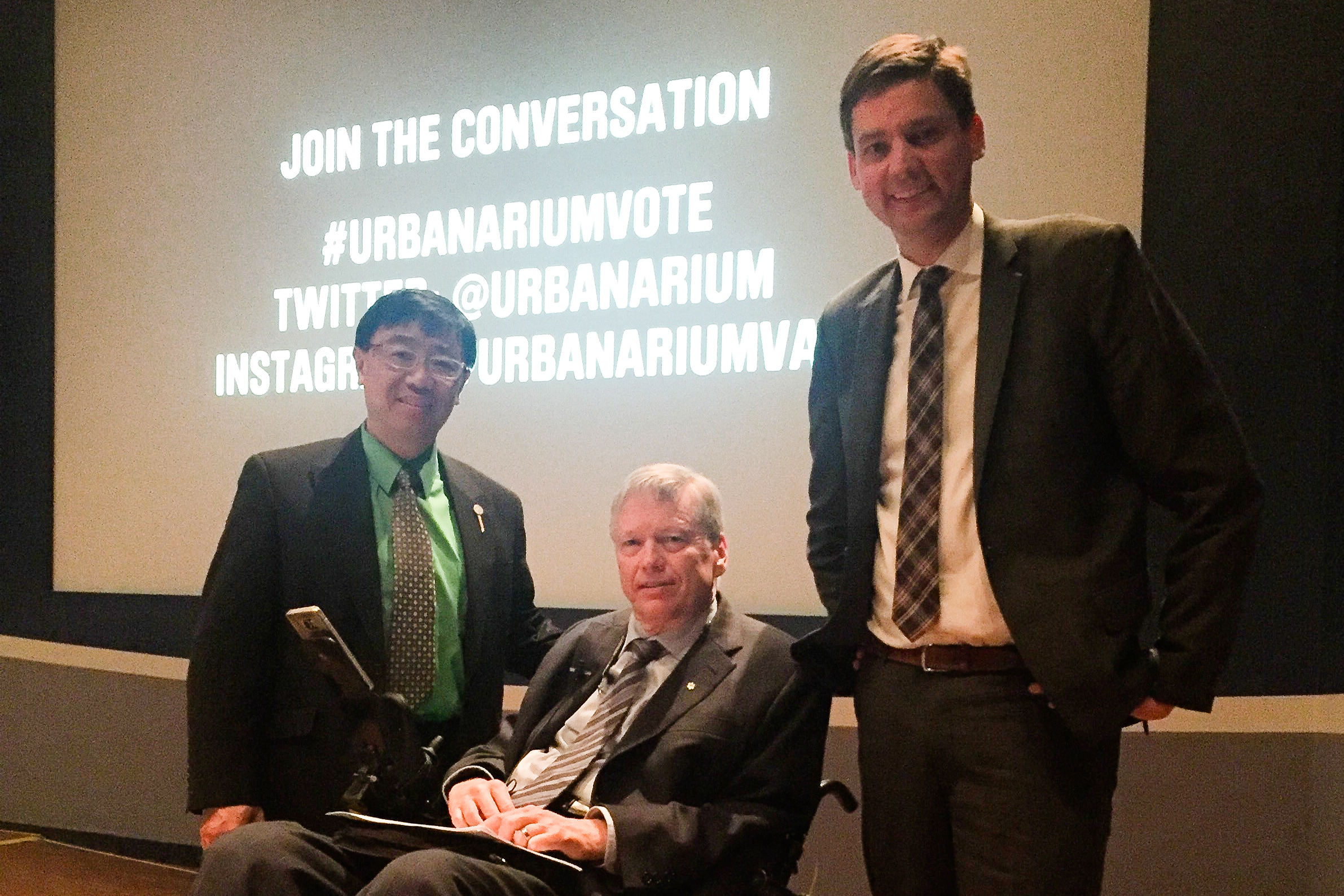A lawyer, an architect and a former Vancouver mayor were the candidates who sparred at a housing debate in Vancouver on April 26. A major theme was the provincial government’s role in managing supply and demand to help British Columbians find adequate shelter.
“I look at this housing crisis, and it’s really got three important issues: supply, supply, supply,” said Sam Sullivan, the BC Liberal incumbent for Vancouver-False Creek, who served as the city’s mayor in the mid-2000s before Gregor Robertson.
His opponents, NDP incumbent David Eby of Vancouver-Point Grey, and the Greens’ David Wong of Vancouver-Hastings, were not convinced.
Eby, a lawyer, noted that Metro Vancouver in 2016 had an all-time record of housing starts, yet housing did not get more affordable. There were about 28,000 housing starts in the region in 2016, a 34 per cent increase from the previous year.
Sullivan stood firm that greater density that allows for more housing is the answer. He mentioned launching the “EcoDensity” vision when he was mayor — increasing urban density that takes advantage of walking, transit and cycling — despite being told at the time by advisors that pushing for the dreaded D-word could be harmful politically.
Sullivan gave a nod to the rise of YIMBY (yes in my backyard) groups calling for more affordable housing in Vancouver, saying “we don’t want to be San Francisco” where neighbourhood groups have long halted much-needed development, a resistance he dismissed as “the NIMBY shuffle.”
The rental crisis
Replying to Sullivan, the Greens’ Wong, an architect, drew applause for making an important distinction: “It’s not the supply, it’s the kind of supply.”
Certainly one type of housing where supply has been sorely lacking in Metro Vancouver is rentals. Over a third of the region’s population rents. In Vancouver proper, a little more than half of city households rent.
Metro Vancouver had a vacancy rate of 0.7 per cent in 2016, according to CMHC. A healthy rental market usually has a vacancy rate closer to three to five per cent.
Eby said the first housing priority of an NDP government would be to push for a “rental housing boom,” something that has not happened in Canada since the federal government stopped providing incentives to build rental apartments in the mid-1980s.
The NDP MLA also said that municipalities should be empowered to create rental-only zones, something from his party’s platform, which would preserve rental apartments from being demolished and replaced with only condos.
The Greens also support more rentals, said Wong, but want to go beyond adding supply. The party would push to provide temporary homes for renters displaced when buildings are redeveloped for higher density.
“That’s something that always gets forgotten,” said Wong, who recalled the discredited 20th century practice of “urban renewal,” which almost always results in vulnerable and low-income communities being displaced.
The role of the government
Sullivan said the BC Liberals had cooled the demand side of runaway housing price increases with the foreign buyers tax. As for supply, he said, leave it to the market.
“I believe there is so much money there waiting to develop housing privately that we don’t need to build government housing,” said Sullivan. “All you need to do is rezone and you will find so many builders looking to build.”
Eby was concerned about those who can’t afford what the private market has to offer. That’s where the government needs to step in to help, he said.
“If private housing was a solution, I think we would’ve seen it over the last ten years,” said Eby. “What we need is for the government to be involved in creating the supply of affordable housing.”
As the NDP’s housing critic during the Clark government’s term, Eby said he had been frustrated to see the Liberals sell off public land that could have been used for affordable housing run on non-profit lines run by co-ops or land trusts.
Eby says he’s pained by the missed opportunity of Little Mountain every time he drives by. The 15.2-acre property held 224 units of social housing until 2008, when BC Housing sold it to developer the Holborn Group (also behind Trump Tower) for $300 million. Former residents were told they’d be able to move back in to the redeveloped property (1,291 market condo units, 282 social housing units) by 2010. Only 53 units for seniors are complete today.
“Selling this land is like logging old growth forests,” said Eby. “It’s not coming back, so we need to use it wisely.”
The election is May 9.
The debate was part of a series of debates organized by Urbanarium, a local non-profit of academics, planners and citizens passionate about urban issues. The Tyee was the event’s media sponsor. ![]()
Read more: BC Election 2017, BC Politics, Housing


















Tyee Commenting Guidelines
Comments that violate guidelines risk being deleted, and violations may result in a temporary or permanent user ban. Maintain the spirit of good conversation to stay in the discussion.
*Please note The Tyee is not a forum for spreading misinformation about COVID-19, denying its existence or minimizing its risk to public health.
Do:
Do not: